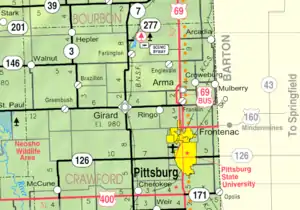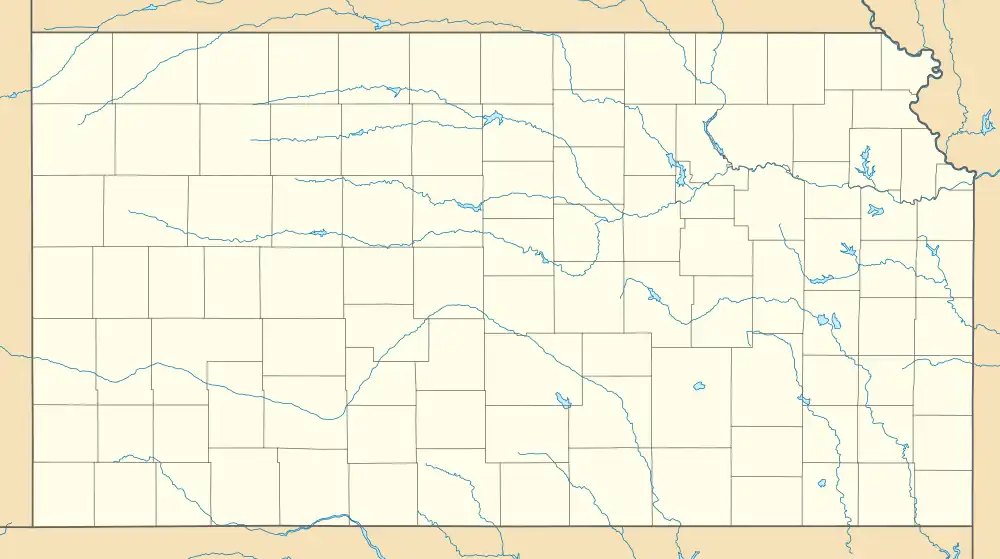Croweburg, Kansas
Croweburg is an unincorporated community in Crawford County, Kansas, United States.[1] As of the 2020 census, the population of the community and nearby areas was 92.[2]
Croweburg, Kansas | |
|---|---|
 KDOT map of Crawford County (legend) | |
 Croweburg  Croweburg | |
| Coordinates: 37°33′10″N 94°40′07″W[1] | |
| Country | United States |
| State | Kansas |
| County | Crawford |
| Elevation | 912 ft (278 m) |
| Population | |
| • Total | 92 |
| Time zone | UTC-6 (CST) |
| • Summer (DST) | UTC-5 (CDT) |
| Area code | 620 |
| FIPS code | 20-16475 |
| GNIS ID | 2806470[1] |
History
Croweburg was a station on the Joplin & Pittsburg electric line.[3] The settlement was named after Crowe Coal Company and consisted of four coal mining camps, which were in operation from 1900 to 1940.[4] Until 1912, Croweburg was a sundown town, where African Americans were not allowed to live.[5]
A post office was opened in Croweburg in 1908, and remained in operation until it was discontinued in 1972.[6]
Demographics
| Census | Pop. | Note | %± |
|---|---|---|---|
| 2020 | 92 | — | |
| U.S. Decennial Census | |||
For statistical purposes, the United States Census Bureau has defined Croweburg as a census-designated place (CDP).
References
- U.S. Geological Survey Geographic Names Information System: Croweburg, Kansas
- "Profile of Croweburg, Kansas (CDP) in 2020". United States Census Bureau. Archived from the original on November 18, 2021. Retrieved November 17, 2021.
- Blackmar, Frank Wilson (1912). Kansas: A Cyclopedia of State History, Embracing Events, Institutions, Industries, Counties, Cities, Towns, Prominent Persons, Etc. Standard Publishing Company. pp. 485.
- "Croweburg mining camp, Crawford County, Kansas". Kansas Memory. Kansas Historical Society. Retrieved March 3, 2019.
- "A.P. Roundtree Esq". The Kansas Baptist Herald. Topeka, Kansas. May 20, 1912. p. 1 – via Newspapers.com.
One of the leading colored men in southeastern Kansas is Mr. A. P. Roundtree, formerly of Topeka, Kans. He now resides at Groweburg [sic], a mining camp in which no negroes were allowed to live. Mr. Roundtree learned of this condition, went immediately to the company and agreed to furnish them all of the skilled colored miners needed, and that they would move into the camps, at once, if the company consented. Consent was given and Mr. Roundtree lead [sic] the colored miners to victory.
- "Kansas Post Offices, 1828-1961 (archived)". Kansas Historical Society. Archived from the original on October 9, 2013. Retrieved June 6, 2014.
Further reading
This article is issued from Wikipedia. The text is licensed under Creative Commons - Attribution - Sharealike. Additional terms may apply for the media files.
